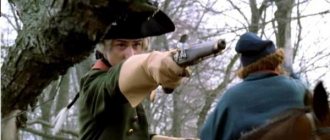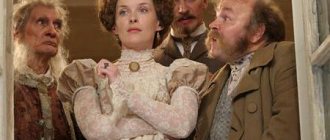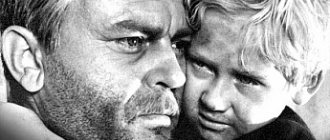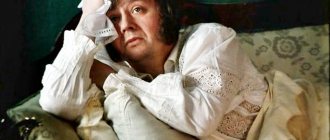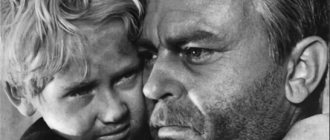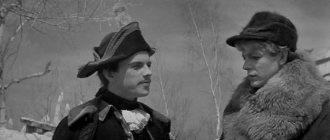“The Captain's Daughter” is a story that did not leave any reader indifferent. It touches on such eternal themes as nobility, honor, love and betrayal. The story can be called a real masterpiece of literature, because it makes it possible to think about human qualities, actions and actions of people in various difficult situations. You can find out how Grinev met the general by reading the story “The Captain's Daughter.” This moment is one of the most important in the work.
Characteristics of Grinev
In the story “The Captain's Daughter,” Pyotr Andreevich Grinev was the main character, who fully revealed himself to the reader and showed his true character. There were many difficult situations in the novel in which Peter behaved like a real honest and kind man, not afraid to give his life and never asking for mercy.
When his father sent Grinev to serve, he told his son to take care of his honor from a young age. Peter did not disobey his father and appeared before the reader as a man for whom honor comes first. However, love made him go against the truth.
The question of how Grinev met the general became one of the most important in the story. The future fate of the lover Peter and Masha Mironova depended on what decision the general made.
Characteristics of Shvabrin
Grinev’s characterization is completely opposite to Shvabrin’s. Alexey Ivanovich is an angry, envious and hypocritical person. When Peter arrived for duty, Shvabrin and Grinev became friends thanks to common interests, education and age. But their partnership was ended by their love for Masha Mironova. Pyotr Andreevich communicated well with her mother and father, became close to them and doted on Masha. The quarrel between Shvabrin and Grinev occurred after Alexey criticized Peter’s “love song” for Maria. In addition, the traitor desecrated Masha and hinted about her “dirty” and incorrect behavior, as well as morals.
Grinev's first meetings with Pugachev
Grinev met the robber Pugachev several times in the story. Their first meeting took place unexpectedly for both of them on Peter’s way to Orenburg. Grinev was caught in a snowstorm, and he didn’t know which road to take to get to the right place. On his way he met a stranger who offered to take the man to his apartment. In gratitude, Peter gave him his hare sheepskin coat and treated him to wine.
The second meeting between Pugachev and Grinev took place under more severe circumstances. Pugachev captured the Belogorsk fortress and executed its commandant Mironov, as well as his wife. Pyotr Andreevich was supposed to die on the gallows along with them, but Pugachev remembered his noble deed and pardoned him.
Grinev's first meeting with Pugachev. (Analysis of Chapter II of A.S. Pushkin’s story “The Captain’s Daughter.”)
While working on “The History of the Pugachev Rebellion,” A.S. Pushkin carefully studied eyewitness accounts; he was of great interest in the appearance of Pugachev, about whom many memories were preserved. We get acquainted with the first description of Pugachev’s appearance in the second chapter. Caught in a snowstorm, Grinev stumbles upon either a wolf or a man. This comparison with a predatory beast is symbolic: the hero who appears is the leader of a bandit pack. Just a few words spoken by the stranger calm Grinev, and he falls asleep, “lulled by the singing of the storm and the rocking of the quiet ride.” The dream that the hero sees in an allegorical form reveals the further development of the plot and testifies to the indelible impression made on Grinev by the counselor. The hero was struck by the combination of the incongruous: the “scary man” who filled the room with dead bodies, “kindly called me, saying: “Don’t be afraid, come under my blessing...” Waking up and entering the inn, Grinev immediately began asking about the counselor, and here we get to know each other with a more detailed portrait of the hero: “His appearance seemed remarkable to me: he was about forty, average height, thin and broad-shouldered. His black beard showed streaks of gray; the lively big eyes kept darting around. The face had a rather pleasant, but roguish expression. The hair was cut into a circle; he was wearing a tattered overcoat and Tatar trousers.” Such a description indicates that the hero is not as simple as he might seem. Shifting eyes, a roguish expression on his face and a thieves' conversation force Grinev to intensely peer into the stranger's face, but he remains unsolved both for him and for the reader. The next meeting of the heroes takes place in the chapter “Attack”. First, Pugachev appears before us in the role of a military leader. He is drawn in the midst of an armed crowd, his portrait is given as a generalized image of the leader: “Between them on a white horse rode a man in a red caftan with a drawn saber in his hand: it was Pugachev himself. He stopped; he was surrounded, and, apparently, at his command, four people separated and galloped at full speed right up to the fortress.” The attributes with which the hero surrounds himself testify to his desire to correspond to the people’s idea of the commander. Both the defenders of the fortress and the attackers see that Pugachev is the center of the crowd, he controls the unfolding events. A cannon salvo from the Belogorsk fortress helps to show Pugachev in the role of a military leader even more convincingly. Frightened by the grapeshot, “the rebels fled in both directions and retreated. Their leader was left alone in front... He waved his saber and seemed to be fervently persuading them..." We do not hear the hero's words, but his tense figure and plasticity speak of the impact that he is currently having on his subordinates: "Scream and squeal, silent for a minute, immediately resumed...” For the third time, the description of the hero was given during the execution. Pugachev’s clothing and behavior testify to the idea that the people have about the Tsar-Father; an almost popular print picture comes to life before us, against the background of which the spilled real blood looks unnatural: “Pugachev was sitting in an armchair on the porch of the commandant’s house. He was wearing a beautiful Cossack caftan trimmed with braid. A tall sable cap with golden tassels was pulled down over his sparkling eyes.” During the pronouncement of death sentences, Pushkin deliberately did not show the expression of Pugachev’s face and eyes; he outlined only abrupt gestures and sharp phrases: “Pugachev frowned gloomily and waved a white handkerchief... “Hang him!” - said Pugachev, without even looking at me.” In the chapter “The Uninvited Guest,” three portraits of Pugachev appear one after the other. First, priest Akulina Pamfilovna talks about Pugachev’s “hawkish”, predatory eyes, then Grinev is given the opportunity to see the counselor himself in his new guise. Once at the military council, Grinev carefully looks at his terrible acquaintances: “... Pugachev and about ten Cossack elders sat in hats and colored shirts, flushed with wine, with red faces and shining eyes... I began to examine the gathering with curiosity. Pugachev sat in the first place, leaning on the table and propping up his black beard with his wide fist. His facial features, regular and quite pleasant, did not express anything ferocious.” The duality of the face that caught Grinev’s eyes at the inn, or Pugachev’s closeness, which manifested itself during the execution, disappear, the author focuses on the lack of ferocity in his appearance. When making an important decision, Pugachev is serious and calm, we see him in a new form. The author admires the patriarchal simplicity and sincerity of the relations of the Cossacks, clearly contrasting them with the military council in Orenburg. In the next picture, the hero is united with his comrades in a single emotional impulse caused by the performance of a folk song “It is impossible to tell what effect this common folk song about the gallows, sung by people doomed to the gallows, had on me. Their menacing faces, slender voices, the sad expression they gave to already expressive words - all this shocked me with some kind of pyitic horror,” Grinev shares his feelings. Pugachev in this description again appears in a new role. His appearance is correlated with the folklore image of a robber, the fate of the hero is mirrored in the song he sings. However, within a few minutes another person appears in front of us: “Pugachev looked at me intently, occasionally squinting his left eye with an amazing expression of trickery and mockery. Finally he laughed, and with such unfeigned gaiety that I, looking at him, began to laugh, without knowing why.” Pugachev's laughter instantly brings him closer to Grinev, he again turns into a cheerful counselor who saved a young officer during a snowstorm in the steppe. A sincere conversation arises between the heroes, Grinev refuses to recognize his sovereign in the clever tramp and serve him, and Pugachev, turning a blind eye to the impudent words of the captive, allows him to leave. It was after this meeting that Grinev became imbued with sympathy for Pugachev, which then grew into a deeper and more painful feeling: “I cannot explain what I felt when parting with this terrible man, a monster, a villain for everyone except me. Why not tell the truth? At that moment, strong sympathy attracted me to him. I ardently wanted to snatch him from among the villains whom he led, and save his head while there was still time.” Marina Tsvetaeva in her book “My Pushkin” drew attention to Pugachev’s “magical appearance,” “with which Pushkin immediately fell in love. Chara is in his black eyes and black beard, charm is in his grin, charm is in his dangerous tenderness, charm is in his feigned importance...” Grinev is fascinated by Pugachev just like their common creator.
Peter's meeting with the general. War Council
After the commandant of the fortress, Mironov, and his wife were executed, their daughter Masha remained in the fortress thanks to the fact that the priest introduced her as his niece. Grinev really wanted to save his beloved, but he understood that he could not cope with this difficult task alone.
The reader can only learn about how Grinev met the general by reading the story “The Captain’s Daughter” in full, because it is almost impossible to find these events in brief descriptions of the novel.
Grinev decided to turn to a military general for help so that he could help him free Masha Mironova. Peter found him in the garden. The general was in a calm mood, admiring the apple trees and wrapping them in straw. He began to ask Grinev about all the terrible events he had witnessed. Peter told the general about everything, including about Mironov and his wife. The old man said with compassion and sympathy that he felt sorry for the commandant of the fortress and Vasilisa, because they were very good, kind and honest people.
After which the general asked Grinev where the captain’s daughter was now. Peter replied that she remained in the fortress and now it is not known what the robbers can do to her. To which the old man affirmatively told the young man in love that he would gather a military council, and they would all decide together what actions would need to be taken.
The general invited only all the main city officials to the military council, but did not call any of his officers. They were all elderly people and always preferred to make only passive decisions. They also did not respond to Pyotr Andreevich’s request. Therefore, Grinev was left without the general’s help, despite the fact that only he was able to help the young man in love.
Grinev's first meeting with Pugachev
When we talk about Pushkin, we usually talk about him as the greatest Russian poet. It was his poetic works that made him a favorite of Russia, its great poet, during his lifetime. But Pushkin’s significance is great in the history of not only Russian poetry, but also prose. The number of prose works by Alexander Sergeevich is very significant. These include: “The Blackamoor of Peter the Great”, “Journey to Arzrum”, “The Queen of Spades”, “The History of Pugachev”, “The Captain’s Daughter” and others. The historical story "The Captain's Daughter" gives a broad and comprehensive portrayal of the peasant uprising under the leadership of Pugachev. The story addresses questions about the relationship between landowners and the peasantry, the causes of peasant unrest, and the duties of a nobleman to the people and the state.
Since “The Captain’s Daughter” is not only a historical story, but also a family story, Pushkin raises questions related to the moral and everyday side of the life of the nobility, the themes of human happiness, love, true nobility. Both of these sides of the story form a single whole, connected by the image of Pugachev - the leader of the popular movement and the organizer of happiness of Pyotr Grinev and Masha Mironova. As you read, you notice that the decisive role in Grinev’s fate is played by a counselor who accidentally met him in the Orenburg steppe during a snowstorm, who later turned out to be Pugachev himself.
The counselor is the only person who did not lose his head during the storm and did not lose heart. He stood on solid ground and found his way to the inn, showing quick wit and ability to navigate. Grinev thanked him for the help and gave the counselor his sheepskin coat. An inconspicuous episode with a hare sheepskin coat skillfully connects both parts of the story. It is also important that the mysterious counselor appears in the “muddy swirl of a blizzard.” The snowstorm, during which the figure of a counselor appears in front of Grinev, seems to symbolize and predict that social storm (popular uprising) that again pitted Grinev against Pugachev, this time the “counsellor” of the people, the leader of the peasant uprising.
Finally, the snowstorm is the beginning of the Grinev-Pugachev storyline. If there had not been a snowstorm, the acquaintance of these two main characters would not have happened, and Grinev’s fate would have obviously turned out differently. It was the snowstorm that caused the carriage to go astray and the meeting between Grinev and Pugachev took place, which determined their future relationship. Immediately after meeting with an unknown counselor, Grinev sees a “prophetic” dream during a snowstorm. In a dream, he returns home and finds out that his father is dying. However, kneeling at his bedside to receive his father’s last blessing, Grinev sees that this is not his father at all. His place is taken by a cheerfully looking “man with a black beard,” under whose blessing Grinev’s mother convinces him to come up.
Grinev's dream hints at the events that will unfold later: the execution of the defenders of the Belogorsk fortress, Pugachev's pardon of Grinev and his further patronage. The dream is also foreshadowed by the contradictory attitude of Pyotr Andreevich towards the leader of the peasant uprising. This dream is deeply entertaining: having nothing mystical in it, it sets Grinev up for a heightened perception of further events.
When Pugachev entered the Belogorsk fortress, he generously paid for a glass of wine and a hare sheepskin coat: he gave Grinev life and is a kind of earthly providence for Grinev, enhancing his family happiness. Having learned from Masha’s letter about Shvabrin’s demand to marry him no later than three days under threat - otherwise, he will hand her over to Pugachev as the daughter of Captain Mironov, Grinev rushes to the general, the commandant of Orenburg. After the general’s refusal to help Grinev, he goes to the Belogorsk fortress, but on the way he is seized by Pugachev’s guards and forcibly brought to the Berdskaya settlement; Thus, he ends up in “Pugachev’s refuge” not intentionally, but by accident. Taking advantage of the opportunity, he complains to Pugachev and asks him to protect the orphan. Hearing that his people were offending Masha, Pugachev was indignant: “Which of my people dares to offend an orphan?... I’ll teach Shvabrin a lesson.”
Pugachev keeps his promise, goes with Grinev to the Belogorsk fortress, frees Masha from Shvabrin’s power and even suggests to Grinev: “Perhaps I will be the imprisoned father. God give you love and advice!” Essentially, he blesses the lovers. One involuntarily recalls Grinev’s prophetic dream and the prophetic words of his mother that sounded in this dream: “It doesn’t matter, Petrusha... this is your imprisoned father; kiss his hand and may he bless you.” In Pushkin’s depiction, the leader of the peasant uprising turns out to be the organizer of human happiness. Grinev and Masha owe their happiness to him. The significance of Pushkin’s prose was well revealed by A. M. Gorky: “As a prose writer,” Gorky writes, “he wrote the historical novel “The Captain's Daughter,” where, with the insight of a historian, he gave a living image of the Cossack Emelyan Pugachev, the organizer of one of the most ambitious uprisings of Russian peasants. His stories laid the foundation for Russian prose."
Bibliography
To prepare this work, materials from the site https://www.bobych.spb.ru/ were used
Information about the work “The first meeting of Grinev with Pugachev”
Section: Literature and Russian language Number of characters with spaces: 5016 Number of tables: 0 Number of images: 0
Similar works
Selfless and unconditional giving in Pushkin's Captain's Daughter
15541
0
0
... sides...". But we feel that Grinev’s refusal upsets him. In "History" there is only a cruel exchange: obedience for life. It’s completely different in “The Captain’s Daughter”: although at first events develop in a similar way, then the principle of “selfless giving” comes into force. This is more of a “duel of generosity” between Grinev and Pugachev, although Grinev is only taking advantage of this. Skillfully playing with words in...
I awakened good feelings with the lyre
6630
0
0
... writer. The living feeling of compassion, guilt, and repentance in the works of Russian writers grew and expanded thanks to Pushkin’s covenant of mercy for the fallen. And for a long time I will be so kind to the people, That I awakened good feelings with my lyre. That in my cruel age I glorified Freedom and called for mercy for the fallen. No matter how you interpret the last line of A. Pushkin’s poem “Monument”, in any case it is...
Historical theme in Russian literature
24765
0
0
... publicity as the beginning of public opinion,” Belinsky pointed out. After the Patriotic War of 1812, “all of Russia entered a new phase,” notes Herzen. Russian literature is also entering a new phase. 2. Historical theme in Pushkin’s work Pushkin thinks about the “eternal contradictions of essentiality” that characterize the development of life, about the complex and contradictory inner world of man in his...
Sets of essay topics for conducting a written exam in literature in the 11th grade of general education institutions, 2001/02 academic year
26099
0
0
... in one of the works of literature of the 20th century. 7. The originality of the problems of M. Gorky’s early prose. (Using the example of one of the stories.) 8. The theme of heroism in one of the works of Russian literature. No. 10 1. Pechorin and the “water society” in M.Yu. Lermontov’s novel “A Hero of Our Time.” 2. “Scary world! It’s too small for the heart!” (According to the lyrics of A. Blok.) 3. Duel of Pierre with Dolokhov. (Analysis of an episode from the novel by L.N. ...
Pugachev's decision
The fate of Masha Mironova and Peter himself depended on how Grinev met with the general. After the refusal of the old man and members of the military council, Grinev and Savelich go back to the fortress to help their beloved. On the way, they are detained by robbers from Pugachev’s “gang”, brought to their chieftain and begin to interrogate Peter. Grinev honestly talks about his intentions, that he wanted to free his beloved.
Pugachev clearly had sympathy for Grinev and promised that he would release Masha Mironova and himself. However, Shvabrin once again showed his hypocrisy and malice by telling Pugachev that Masha is the captain’s daughter. But it is worth noting that this did not influence the chieftain’s decision, and he still let the lovers go.
Because of Shvabrin, Peter began to be suspected of serving Pugachev and was sentenced to exile in Siberia, however, fortunately for him, Masha told the empress about who Grinev really was, and she decided to release him.
Grinev’s meeting with the general to some extent played a very important role. If he had not refused Peter, everything could have turned out differently: Masha and Peter could have been executed. Therefore, in many ways, the fate of the lovers depended on this meeting.
"The Captain's Daughter" by Alexander Sergeevich Pushkin
The question of whether Alexander Sergeevich Pushkin was in Arzamas was raised by many researchers, and none of them found a clear answer to this question. Nevertheless, in our city there is a Pushkin Grove, planted in honor of the fact that this great writer passed through our city to his family estate in Boldino.
One of my favorite works by A.S. Pushkin’s story “The Captain’s Daughter”, where I especially remember the episode of the first meeting of the main character Grinev with Pugachev, described in the second chapter of the work.
The story is based on real events that occurred in 1774 - 1775 - the peasant uprising led by Pugachev. But the plot of the story is not just historical facts that took place in the second half of the 18th century; in the work, the author reveals the spiritual and moral essence of Emelyan Pugachev and his entourage, shows the characters of the people of that time. The reader sees images of historical figures through the prism of the attitude towards them of the fictional hero Pyotr Andreevich Grinev, whose life and happiness are closely connected with the fate of Pugachev. What is the reason for this? In my opinion, this allowed the author to avoid schematizing the character and allowed him not only to convey his character, but also to show how Pugachev was perceived by his contemporaries. It is also important that Grinev’s social status allows him to be more objective in assessing this historical figure. Pyotr Andreevich does not extol Pugachev, as did the peasants around him, who called their leader the sovereign. But at the same time, Grinev perceives Pugachev not just as a rebel who rebelled against the empress, he is able to discern in him those character traits that adorn him. Pugachev is honest, he never broke his word, he is capable of being grateful.
I would like to note that our city of Arzamas also played an important role during the period of the peasant war under the leadership of E. Pugachev. In 1774, Pugachev’s troops dispersed throughout the Nizhny Novgorod region, then called the province, and in the Arzamas region alone over 62 villages rebelled.
The episode of Grinev’s first meeting with Pugachev has an important place in the work. It is at this moment, when Pyotr Andreevich gives Pugachev a hare’s sheepskin coat in gratitude for showing him the way to the inn, the leader of the rebel peasants becomes imbued with sympathy for Grinev. This episode is also remarkable because in it Pugachev appears to the reader not as a formidable head of the rebels, but as an unremarkable “peasant”, which makes the image more complete. Grinev, not frightened by a possible execution, in the calm atmosphere of the inn more objectively assesses Pugachev’s appearance and his manner of communication. Pugachev’s ambiguity is not just the author’s invention, because even to our time rumors have reached that Arzamas merchants would greet the leader of the peasants with “bread and salt.”
It is noteworthy that Grinev’s first meeting with Pugachev takes place on the road: Pyotr Andreevich meets the leader of the rebels when he is heading from Simbirsk to Orenburg. The road is a symbol of variability, impermanence of life, its unpredictability. Young Grinev goes to serve, not yet knowing where he will serve, and has absolutely no idea what awaits him in the future.
Initially, Grinev appears to the reader as an impatient and self-confident man: he does not listen to the coachman’s advice to turn back and wait out the snowstorm at the inn, but orders him to continue on his way, hoping to “get to the next station in time.” At the same time, Grinev is a self-critical person, capable of admitting his mistakes: he feels guilty before Savelich when he realizes that he was wrong. And, in turn, Pyotr Andreevich’s uncle, a wise man who cares about Grinev, is ready to blame himself rather than the master’s son.
In my opinion, it is very important that Grinev’s first meeting with Pugachev took place when Pyotr Andreevich, who found himself in the steppe during a snowstorm, needed help. From that moment until the end of his life, Emelyan became his benefactor.
Of particular importance in the story is Pyotr Andreevich’s dream, which happened when he fell asleep, “lulled by the singing of the storm.” It is here that the author for the first time points out the duality of Pugachev’s image, using the technique of contrast. Images of dead bodies, bloody puddles, an ax snatched from behind his back fill Grinev with horror. But at the same time, many details of his dream indicate a good attitude towards him by a person who sows death around himself.
Through the mouth of Grinev, the author calls his dream prophetic. In my opinion, it really reflects the entire subsequent fate of Pyotr Andreevich: the leader of the rebels, who killed countless people, more than once helps Grinev - saves him from execution, frees his beloved.
The action of the second part of the chapter about Grinev’s first meeting with Pugachev takes place at the inn, where Pyotr Andreevich and his uncle were brought by their “counselor.” A description of Emelyan’s appearance is also given here, which made a rather pleasant impression on Grinev.
The author shows the nobility and gratitude of Pyotr Andreevich, who decided to thank the man, but could not break the promise he made, according to which the money was at Savelich’s complete disposal, so he gave the “tramp” his hare sheepskin coat.
After E. Pugachev was captured, peasant riots did not subside for a long time in Arzamas, and only in 1775 they were suppressed in all villages. During these years, the Arzamas land was again filled with blood and tears. And although only two of all the peasants who took part in the battle were executed, many of them were distributed to prisons, and the life of those who were in captivity became even more difficult.
